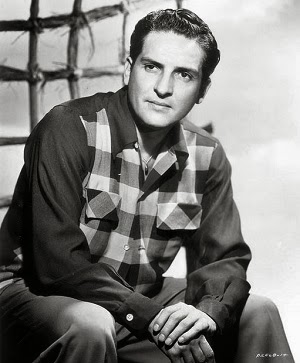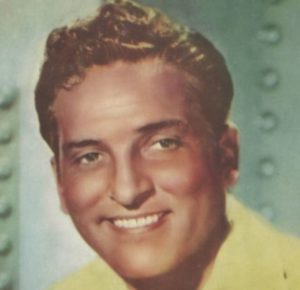Arturo García Rodríguez (Merida, May 7, 1907 – Mexico City,3 of November of 1973), known like Arturo de Córdova, was an actor
Mexican, protagonist of the call “Golden Time of the Mexican Cinema”,filmed more than a hundred films as urban galler of black cinema, dramas psychological and urban comedies. He had a deep, sonorous voice nuances and a slight Argentine accent, which would accompany him in all his interpretations.
He was born in the city of Mérida, Yucatán, on May 7, 1907. His parents were Arturo García Pujol and Isabel Rodríguez Echeverría Muro, both Cubans living in Merida. Until the age of seven he lived in his hometown. Then his family took him to the United States where he was until age 12, when they moved to Argentina and later sent their parents to Switzerland to study languages. All this pilgrimage of the family obeyed to the fear and desire to flee from the revolutionary vortex that shook the country, in those years.
In the first stage of the Ariel Awards between 1947 and 1958, when the delivery was discontinued until the year 1972, was the actor with more nominations in the category Best Actor for his work in: The Forest of Fire (1947), Midnight (1950), The Man Without a Face (1951) and My Wife and the Other (1953),being also in that period the most laureate, winning in the other three occasions for the films: In the palm of your hand (1952), The three perfect married women (1954) and Happy New Year, my love (1958).
Also in 1948 for his performance in ‘Dios se lo Pague’ was awarded with the award for Best Actor and in 1950 received a special mention for his participation in the film Nacha Régules, both granted by the Academy of the Cinematographic Arts and Sciences of Argentina.
In 1932 he sought to emigrate to the United States, but during the trip made a stopover in Merida to recognize his hometown, staying there several months to be “enchanted” by a pretty young girl named Enna Arana, with which ended up marrying the 23 of August of 1933. Following his marriage decided to stay in Mérida where he soon found employment as a announcer, because his voice was clear, sonorous and manly, and his diction was impeccable. The “white city” soon became small and abandoned to seek fortune in Mexico City.
It was his friend Roberto Cantú Robert who suggested the change of name of Arturo García Rodríguez, for that of Arturo de Córdova when making his cinematographic debut, since “Garcia” sounded too common while “de Córdova” had a certain packaging
aristocratic and refers to the city of Cordoba (Argentina), where he lived in his childhood.
In 1967 he suffered a cerebral embolism that left him with all the left side of the paralyzed body He died on November 3, 1973, in Mexico City because of stroke (stroke).
ARTURO DE CORDOVA, GALAN DEL CINE DE ORO MEXICANO. (Descendiente Cubano).
Arturo García Rodríguez (Mérida, 7 de mayo de 1907 – Ciudad de México, 3 de noviembre de 1973), conocido como Arturo de Córdova, fue un actor mexicano, protagonista de la llamada “Época de Oro del Cine Mexicano”, filmó más de cien películas como galán urbano de cine negro, dramas psicológicos y comedias urbanas. Poseía una voz profunda, de sonoros matices y un ligero acento argentino, que lo acompañaría en todas sus interpretaciones.
Nació en la ciudad de Mérida, Yucatán, el 7 de mayo de 1907. Sus padres fueron Arturo García Pujol e Isabel Rodríguez Echeverría Muro, ambos cubanos radicados en Mérida. Hasta los siete años radicó en su ciudad natal. Después su familia se lo llevó a Estados Unidos donde estuvo hasta los 12, cuando se trasladaron a Argentina y más tarde lo enviaron sus padres a Suiza a realizar estudios de idiomas. Todo este peregrinar de la familia obedeció al temor y deseo de huir de la vorágine revolucionaria que sacudía al país, en aquellos años.
En la primera etapa de los Premios Ariel entre 1947 y 1958, año en que se descontinuó la entrega hasta el año 1972, fue el actor con más nominaciones en la categoría Mejor Actor por su trabajo en: La selva de fuego (1947), Medianoche (1950), El hombre sin rostro (1951) y Mi esposa y la otra (1953), siendo también en dicho período el más laureado, ganando en las otras tres ocasiones por las películas: En la palma de tu mano (1952), Las tres perfectas casadas (1954) y Feliz año, amor mío (1958).
También en 1948 por su actuación en ‘Dios se lo Pague’ fue galardonado con el premio a Mejor Actor y en 1950 recibió una mención especial por su participación en el film Nacha Régules, ambas otorgadas por la Academia de las Artes y Ciencias Cinematográficas de la Argentina.
En 1932 buscó emigrar a los Estados Unidos, pero durante el viaje hizo una escala en Mérida para reconocer su ciudad natal, quedándose allí varios meses al ser “hechizado” por una guapa jovencita llamada Enna Arana, con la cual terminó casándose el 23 de agosto de 1933. A raíz de su matrimonio decidió quedarse en Mérida donde pronto encontró empleo en calidad de locutor, gracias a que su voz era clara, sonora y varonil, y su dicción era impecable. La “ciudad blanca” no tardó en quedársele pequeña y la abandonó para buscar fortuna en la ciudad de México.
Fue su amigo Roberto Cantú Robert quien le sugirió el cambio de nombre de Arturo García Rodríguez, por el de Arturo de Córdova al hacer su debut cinematográfico, ya que “García” sonaba demasiado común mientras que “de Córdova” tenía un cierto empaque aristocrático y hace referencia a la ciudad de Córdoba (Argentina), donde vivió en su niñez.
En 1967 sufrió una embolia cerebral que lo dejó con todo el lado izquierdo del cuerpo paralizado. Falleció el 3 de noviembre de 1973, en la ciudad de México a causa de un ACV (accidente cerebrovascular).
Agencies/CaminandoElTiempo/YouTube/Internet Photos/ Arnoldo Varona/ TheCubanHistory.com
THE CUBAN HISTORY, HOLLYWOOD.







